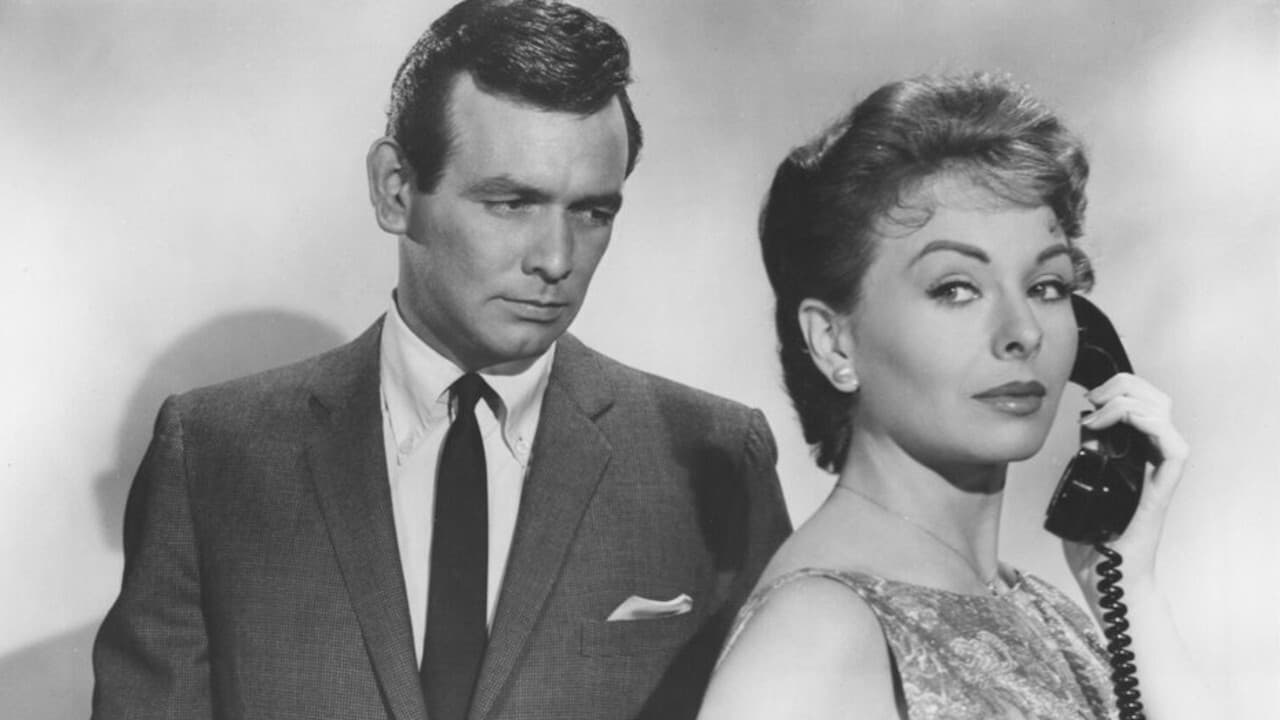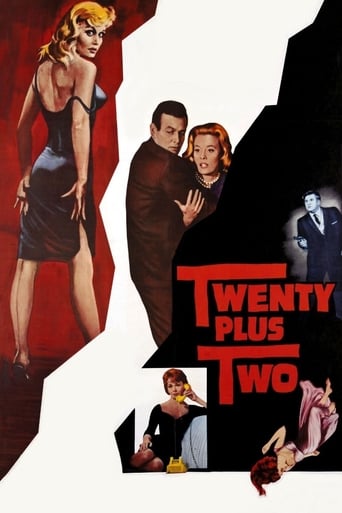

Interesting late film noir, let down by some plot and casting flaws. David Janssen plays the quasi-detective character Tom Adler with an affected booziness; he's not imposing enough to make this Marlon Brando-mumbling-in-a-slick-suit thing work. I do like that his job is nebulous; he seems to have to explain himself repeatedly. It's as though, in true noir fashion, he's really not sure who or what he is.As others have noted, Dina Merrill looks positively middle-aged when she's supposed to be just twenty in the Tokyo flashback. Thankfully, Agnes Moorehead, William Demarest, and Jacques Aubuchon inject Twenty Plus Two with enough life to sustain interest.I like how the reviewer pierrotlunaire0 pointed out the plot holes. I can sort of see Tom falling for Linda all over again, especially as she keeps throwing herself at him. But it's just too convenient that she's also friends with Nikki, his other lost love. Since we never see the 'grown-up' picture that her mom shows him, we don't know that he then suspects that Nikki is Doris. At least that part of the mystery works well.Then there's Brad Dexter's Leroy, who is the actual murderer, going free and easy because he framed Doris. The cabin-in-the-sticks denouement is stagey; but for all of its exposition, it still doesn't add up. How is it that Dane, of all people, doesn't recognize Doris/Nikki until she tells him who she is? Why did he have to kill his buddy anyway? Doris had fled, knowing she had shot Lane. She's still in hot water, and, given the mores of the times (in 1948, even in 1961), her pregnancy makes it worse for her.Lane would have to fear repercussions from her wealthy family; but she'd probably be so relieved when she discovered that she hadn't killed anyone, that nothing more would happen. On the other hand, given that Dexter's character recreates himself as Lane, and became a celebrity, he should've at least been under suspicion as a rapist, if not a murderer.Well, if we can squint our perception of the plot, there are those larger-than-life performances from the supporting cast to entertain us. The flasback sequence is masterfully set up by its ascending webs of smoke signalling Adler's reverie. Thanks to the black and white filming, we not so far from the smoky, boozy, hat-wearing late 40s noir golden age. The editing is pretty good too; we're not allowed to get too comfortable before sweeping into another scene. The exceptions would be the interlude with Agnes Moorehead, which was so good it even made Jannsen look important, the cool 'interview' Tom has with the down-and-out bum in the bar, and the scene in the cabin, which dragged a bit. I'd have been happier with Doris and Tom's scene under the tree giving us a little more, and then letting the shoot-out happen quickly.The music was irritating at times. Kind of like the nervous demeanor Janssen displays when he's not mumbling. Like others, I wonder what the title refers to. The better noir movies have abrupt, dangerous sounding titles that hint at what we're going to see. Other than a presumption that Doris is about twenty years old when she's in Tokyo, there's no twenty, or two, or twenty-two of anything here. Still, a fun movie, with a good premise and some fine scenes.
... View MoreEven in film noir...especially in film noir...the characters and their relationships have to make some sort of twisted sense. So what do you do when your hero, an investigator who searches for missing heirs, meets a beautiful woman and doesn't recall that they were lovers a few years before? Just because she changed her name and her hairdo. You figure it's about as logical as his investigation into the brutal murder of a fan club secretary for which no one seems to have hired him. There are some nice touches in the film -- William Demarest is terrific as a boozy newspaperman, Agenes Moorehead nails a salty old dowager and Jacques Aubachon makes an elegantly talkative con artist. On the other hand, Janet Leigh is mostly window dressing and David Janssen spends too much of the movie muttering moodily.
... View MoreA lawyer begins a search for a woman who went missing as a teen ten years before. He is also forced at gunpoint to take on a search for the missing brother of "the king of the confidence men." He interviews colorful characters, knocks on doors, has flashbacks to his own life, and it all comes together at the end.The plot is intriguing. It is complicated enough to demand your full attention, but not so complicated to be hard to follow. The jazz score has been done many times before and since. It goes well with the movie, but it is inappropriately intrusive here and there.All in all, a nice, neat job. My one complaint is that costar, Jeanne Crain, has little to do here. The costar should have been Dina Merril. I am not so much concerned about billing, I am just a devoted fan of Jeanne Crain
... View MoreI must admit that I expected more from the Joseph Newman's last picture. I thought that it was an authentic film noir, not necessarily with plenty of action, but intriguing, breathless, well done; with a plot not tepid as the one in this feature.The story of a private eye - Janssen - who investigates on a murder and meets a bunch of protagonists; as usual in this kind of production. An unbelievable tale, and complicated at the most. But the music score, jazzy, is adequate as the surroundings. I think it's the only positive point of view about this movie.David Janssen is also rather good in his character, as Brad Dexter, Agnes Moorehead and Jeanne Crain.In short, it's not a corny picture, but if you miss it, I think you'll be able to live without it.
... View More